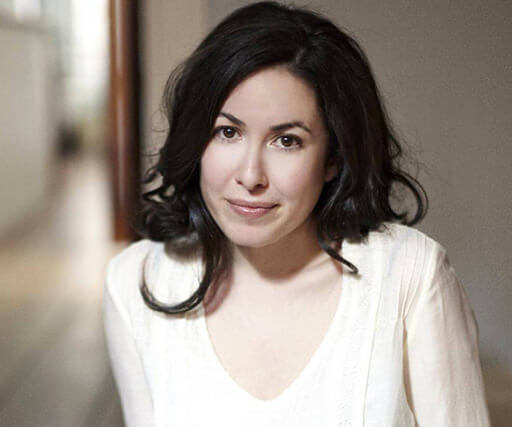
Jessica Lamb-Shapiro is the author of the book Promise Land (http://www.promiselandbook.com). Months before she turned two, Jessica Lamb-Shapiro’s mother committed suicide. Read her inspiring journey about facing her fears and following her dreams!
Genevieve: May I ask how old you are?
Jessica: Absolutely. I just turned 37.
Genevieve: We know you’ve written an inspiring book about your life. Is writing your profession?
Jessica: Yes. I started off writing for literary magazines and small literary journals. It was later that I began writing books. Promise Land is my first published book.
Genevieve: Can you tell us about Promise Land?
Jessica: I really started writing Promise Land by accident. I had just finished grad school and really wasn’t sure what I should do next. My dad asked me to look into a conference that was being conducted on writing self-help books. He’d actually been writing self-help pieces for thirty years, but had never really hit it big. It sounded interesting, so I just followed my curiosity. To me, for a writer, there’s almost no such thing as a worthless experience. I attended the conference, which was taught by one of the co-authors of Chicken Soup for the Soul and, at the end, I began thinking that a self-help book might be interesting to write although it also got me wondering whether self-help books can really help us or whether or not they can lead to false hopes—that is, whether they’re a good or bad thing. The book actually started as an article, and then spiraled out into something much bigger. It wasn’t until I was three years into writing the book that it even occurred to me to write about my mother’s suicide. In retrospect the two topics seem so obviously linked, but I honestly didn’t see it at the time.
Genevieve: Of all your accomplishments professionally, what would do you think is the greatest one to date?
Jessica: Professionally, it’s been an exciting year—especially because of the publication of Promise Land. My interview on the radio program Fresh Air, which I have been listening to since high school, was like a dream come true. I also wrote a piece for the NYTimes magazine, which was, as it would be for most writers, another dream come true.
Genevieve: What do you consider your greatest accomplishment on a personal level?
Jessica: Being able to confront my mother’s death. When I was growing up, even as a teenager, I always felt as if I needed to be strong. I didn’t have anyone to talk to about my mom’s death and I didn’t think I needed to.
Genevieve: When did she die?
Jessica: Ten days before my second birthday. She was only thirty-one.
Genevieve: How did it happen?
Jessica: She killed herself.
Genevieve: How do you feel your loss affected you as a child?
Jessica: I would say it made me really weird.
Genevieve: Weird?
Jessica: Maybe that’s the wrong word, because I don’t really mean it in a bad way. I was just obsessed with seeming strong. And when I say “strong,” I mean never showing any weakness or emotions. I became so “strong,” and it became so much a part of my personality. I even believed it myself. I also felt the need to overachieve—especially academically—even looking down on others for not being the same way. For instance, when I saw kids cry over what seemed to me trivial things, my first thoughts would always be, “They are weak.” To me, it seemed ridiculous that here I am, strong even though my mother died, and there they were crying over something as stupid as a TV remote.
At the time, I didn’t know another other person my age who had lost a parent, and I felt really socially awkward when I had to explain what had happened. It made me feel very isolated.
Genevieve: What do you mean by “isolated?”
Jessica: Because it was, in many ways, actual isolation. While I know that my dad tried to speak about my mom’s death with the community and me at first, it didn’t really work. I could see that people got very uncomfortable when he did, and it felt as though they were avoiding us after awhile. That was too bad because then, and now, I know there’s a part of me that would like my mom’s life to be acknowledged. I may never have really known her, but she was important to me. After all, she was my mother.
Genevieve: How do you think her death affected your family?
Jessica: People didn’t like to talk about it. It was as if everyone wanted to brush everything under the rug—make it disappear. It’s very hard to say what my family would be like if my mom hadn’t killed herself, because I was too young even to remember what she was like. But, after her death, I would call our family “aggressively happy,” as if my father and I had no room for unhappiness. We never celebrated anniversaries; my mom never had a memorial. There was an unspoken attitude that if one of us were to admit a negative feeling, it would be the equivalent of admitting defeat and that the world would crumble.
Genevieve: Were there any times when you were a child that you were afraid the world was going to “crumble?”
Jessica: Every so often I would dare to ask my father a question about my mother and, when I did, his demeanor would immediately change, as if he were about to burst into tears. Having a parent cry is frightening, I think, to every child.
Genevieve: What finally brought you to face your mother’s death and allow yourself to feel unhappy?
Jessica: By the time I was in my twenties, the immense sadness and anger had built up to such a degree that I just couldn’t contain it anymore. And one day, I simply erupted. I just couldn’t pretend to be “okay” anymore when I wasn’t. I’m almost positive that this would never have happened if expressions of grief had been allowed in our family, in a way “normalized” in my home.
Genevieve: What do you mean by “normalized?”
Jessica: I’m not sure people always understand that grief is not something you just “get over.” The truth is, you don’t. Ever. Grief is a process, not one that’s stifled to conform to social pressures. Hiding it doesn’t erase it; instead, it makes it grow. Now I’m doing what I should always have done. I grieve. For the past few years, on my mom’s birthday, I’ve started getting together on my mom’s birthday and the anniversary of her death, with my father. We even light Yahrtzeit candles to commemorate her. This has begun to give me a sense of closure, and it’s helped me to more easily control expression of my emotions when the expression would be inappropriate.
The thing I’m trying to work on now is integration. After losing a parent many people subconsciously split their lives into two realities. Part of you thinks about your parent rarely, and casually, while you go on with life in a relatively “normal” way, much as you did before he or she died. This part makes you feel as if you’re close to “getting over” your parent’s death. The second reality is there as well, however, and it is this somewhat contained feeling of extreme sadness that can erupt, disrupting the normality of your life. It might not happen for years, but when it happens the result is a prolonged sense of extreme, perhaps disabling sadness, an “eruption” similar to what happened to me twenty years after my mom’s death. Integration means bringing these two realities into one—confronting your loss and learning, in a positive way, to live with it.
Genevieve: Have you had help in doing this?
Jessica: Therapy and my therapist.
Genevieve: Do you recommend therapy?
Jessica: Absolutely. There’s something about talking to someone who can, in a sense, “take,” that is, really understand what you are feeling. It’s a safe place where you know you’re not going to be judged nor hurt the person you’re talking to.
Genevieve: Does your therapist help you think about your mother?
Jessica: Probably. Although I would say I’ve been thinking about my mom a lot recently on my own. Sometimes, I’ll think about her every day for weeks. This may be the result of writing Promise Land and, of course, being in public talking about her. And maybe I’m subconsciously compensating for the past twenty some years of forcing myself not to think of her!
Genevieve: When you think of your mom, do you still think of her as someone whose approval you need, even though she is no longer living?
Jessica: When good things happen, I think how proud my mom would be of me. For instance, with my book, it was really sad for me that she wasn’t around when it was published. But when I fail, I don’t think about my mom being disappointed in me. It’s more that I think she would be proud of my successes.
Genevieve: What final advice would you like to give to all of us?
Jessica: For anyone who has recently lost a parent you must believe me that it will get better; the acute pain will grow less over time. We all hurt in different ways but, even then, it’s important to allow yourself the time and space to be sad. Sadness doesn’t mean you’re weak. It means you’re human. In fact, there is strength in allowing yourself to feel sadness, just as it is all right to continue living positively and happily. Doing both really does show how strong you are.
